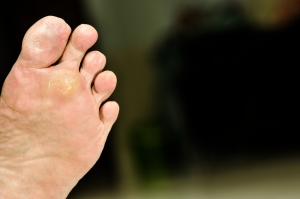Items filtered by date: December 2017
What is Hyperhidrosis?
The purpose of sweating is to regulate the body’s temperature. When this happens excessively, it’s known as hyperhidrosis. Most of the millions of people affected by this condition often feel a loss of control because sweating can occur independent of physical exertion. It may begin in childhood and is thought to be a genetically inherited condition. In severe cases, sweat can drip from the feet, possibly causing social situations to be uncomfortable. Anxiety, depression, infections and skin irritations may occur, resulting in difficulty in handling this condition psychologically. Typically, it helps to identify specific conditions that lead to excessive sweating. To reduce discomfort, keeping the feet dry is advised. Medications and surgery are possible treatment options to regulate this disorder. Please consult with a podiatrist if you have questions about excessive sweating from the feet.
If you are suffering from hyperhidrosis contact Dr. Kenneth Donovan of Advanced Care Foot and Ankle. Our doctor can provide the care you need to attend to all of your foot and ankle needs.
Hyperhidrosis of the Feet
Hyperhidrosis is a rare disorder that can cause people to have excessive sweating of their feet. This can usually occur all on its own without rigorous activity involved. People who suffer from hyperhidrosis may also experience sweaty palms.
Although it is said that sweating is a healthy process meant to cool down the body temperature and to maintain a proper internal temperature, hyperhidrosis may prove to be a huge hindrance on a person’s everyday life.
Plantar hyperhidrosis is considered to be the main form of hyperhidrosis. Secondary hyperhidrosis can refer to sweating that occurs in areas other than the feet or hands and armpits. Often this may be a sign of it being related to another medical condition such as menopause, hyperthyroidism and even Parkinson’s disease.
In order to alleviate this condition, it is important to see your doctor so that they may prescribe the necessary medications so that you can begin to live a normal life again. If this is left untreated, it is said that it will persist throughout an individual’s life.
A last resort approach would be surgery, but it is best to speak with your doctor to find out what may be the best treatment for you.
If you have any questions please feel free to contact one of our offices located in Warren, Livingston, and Toms River, NJ. We offer the newest diagnostic and treatment technologies for all your foot and ankle needs.

